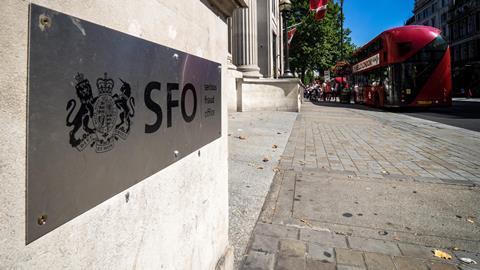New guidance for corporations and businesses on raising concerns about potential fraud or corruption has been released by the Serious Fraud Office – in a first for the agency.
The guidance states that if a corporate entity self-reports suspected wrongdoing and cooperates fully with SFO investigators it can expect, unless exceptional circumstances apply, to be invited to negotiate a deferred prosecution agreement (DPA) rather than face prosecution.
The guidance also states that the SFO will invite a business to DPA negotiation even if it has not self-reported, so long as it has provided ‘exemplary cooperation’ with the SFO’s investigation.
If a business does self-report, the SFO will contact it within 48 hours; decide whether or not to open an investigation within six months of the self-report and conclude DPA negotiations within six months of sending an invitation. The SFO will aim to conclude its investigation within a ‘reasonably prompt time frame’.
The guidance adds: ‘We consider self-reporting suspected corporate criminal conduct to be a mark of a responsible organisation. We do not expect a corporate to fully investigate the matter before self-reporting. If there is direct evidence of corporate offending, we would expect a corporate to self-report soon after learning of that evidence.’
Read more
The five-page document gives examples of what the SFO views as ‘genuine cooperation’. These include preservation of digital and hard copy material and early engagement with the SFO. It added that cooperating during the course of the SFO investigation means ‘providing assistance to us that goes above and beyond what the law requires’.
Referring to legal professional privilege, the SFO says corporates or businesses would not be penalised for maintaining a ‘valid’ claim of privilege over relevant material. ‘However, we consider a waiver of LPP to be a significant cooperative act and it can help expedite matters,’ the guidance adds.
Meanwhile ‘uncooperative’ conduct would include ‘tactically delaying providing information or material’ and ‘overloading’ the SFO investigation by providing ‘unnecessarily large amounts of material that may hinder the effectiveness of the investigation’.
Nick Ephgrave, SFO director, said: ‘Our new guidance sets out how corporates can report suspected criminality to us and what we expect from cooperating corporates. If you have knowledge of wrongdoing, the gamble of keeping this to yourself has never been riskier.’
Speaking to the Gazette earlier this month, Ephgrave said the guidance was the ‘vanguard of our preventative work’ adding that the guidance was ‘really exciting’ as it set out ‘for the first time…what the agency’s “offer” actually is.’
Neil Swift, partner at international firm Peters & Peters, said the guidance is part of the SFO's attempt to kick start the enforcement of the offence of failure to prevent fraud.
However being invited to enter DPA negotiations is still no guarantee that a DPA will be agreed, he said. 'Companies and their advisers will still need to consider the factors for and against a DPA set out in the DPA Code of Practice to determine the likelihood that they will be able to achieve a DPA.
'The director will hope that this leads to more corporate settlements. He will also hope that it provides the opportunity to prosecute executives and lay to rest the SFO’s unfortunate record of individual acquittals following corporate deals.'
This article is now closed for comment.




























3 Readers' comments